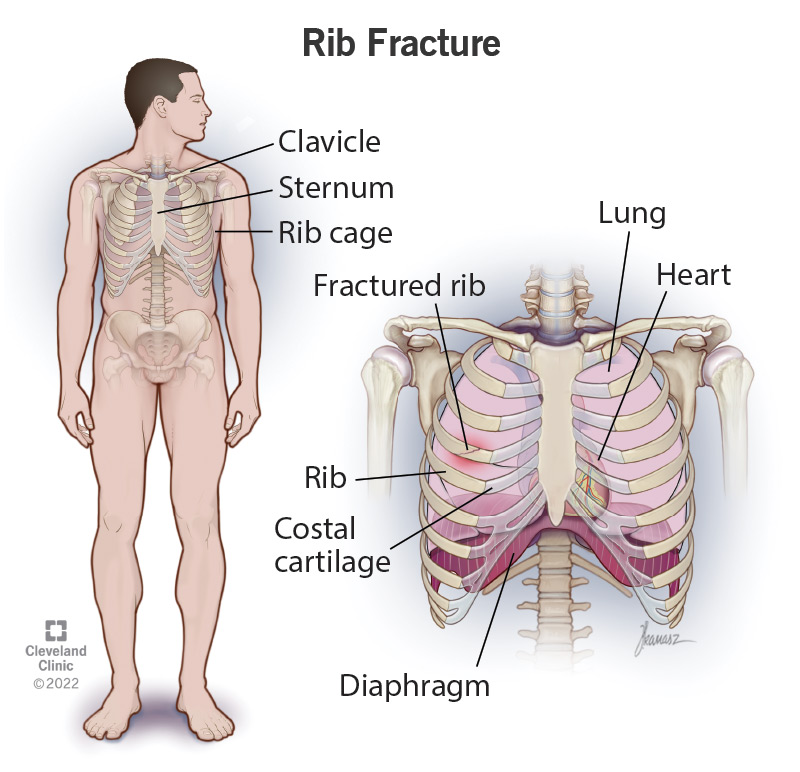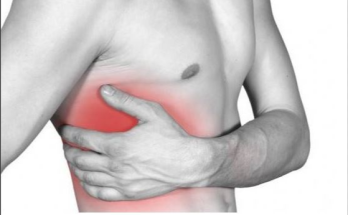What is a rib fracture?
A rib fracture is the medical term for a broken rib. Rib fractures are usually caused by car accidents, sports injuries or other traumas. It’s possible to break a rib without experiencing trauma, too.
It’s rare to need surgery to repair a rib fracture, unless the injury that broke your rib damaged your internal organs. Unlike most other types of bone fractures, you probably won’t need treatment other than rest, ice and breathing exercises. Most people need at least a month to recover from a rib fracture.
Even if you can recover with at-home treatments, rib fractures can have life-threatening complications. See a healthcare provider or go to the emergency room if you’re experiencing symptoms like pain and tenderness around your ribs and chest, or if you have trouble breathing.
How soon after treatment will I feel better?
It’ll take a few weeks for your symptoms to improve. Contact yourhealthcare provider right away if you experience intense pain that doesn’tget better or if you’re having trouble breathing.
How can I reduce my risk for rib fractures?
Follow these general safety tips to reduce your risk of an injury:
- Always use the proper tools or equipment at home to reach things. Neverstand on chairs, tables or countertops.
- Follow a diet and exercise plan that’ll help you maintain good bonehealth.
- Talk to your provider about a bone density test if you’re older than 50 or ifyou have a family history of osteoporosis.
- Use a cane or walker if you have diffi culty walking or have an increasedrisk for falls.
How can I prevent a rib fracture?
Rib fractures are usually caused by falls or other accidents, so there’s notmuch you can to prevent them. Use a cane or walker to increase yourstability and prevent falls.
If you have osteoporosis, treating it will prevent future bone density loss.
What can I expect if I have a rib fracture?
If you have a rib fracture, you should expect to make a full recovery.
How long does it take a rib fracture to heal?
Most people need at least a month to recover from a rib fracture.
There are lots of factors that can affect how long it takes your body to heal.It can take longer to recover if you experienced other internal injuries during rib fracture.
Will I need to miss work or school?
Your specifi c injuries will impact how long you’ll need to miss work, schooland other activities. If you fracture a rib without damaging organs or otherparts of your body, you shouldn’t have to miss work or school while you’rerecovering.
Talk to your surgeon or healthcare provider before resuming any physicalactivities while you’re healing.
Can I exercise with a fractured rib?
Stay active while you’re recovering. Avoid intense workouts and playingsports, but moving and breathing as close to normally for you is animportant part of your recovery. Talk to your provider about how much activity you should do with a broken rib.
When should I go to the emergency room?
If you think you have a rib fracture — or any other broken bone — you need tosee a healthcare provider as soon as possible.
Go to the emergency room ifyou experience any of the following:
- Intense pain.
- You have trouble breathing.
- You can’t move a part of your body that you normally can.
- A part of your body looks noticeably different or out of its usual place.
Go to the emergency room right away if you’ve experienced trauma.
What questions should I ask my doctor?
- Will I need imaging tests?
- Did the fracture injure any of my organs?
- Will I need surgery?
- Which exercises should I do while I’m recovering?
- How long will it take to recover?
- When can I resume physical activities?
A note from Cleveland Clinic: Rib fractures can range from a small crack caused by a random cough to a severe injury after trauma. The most important thing is getting your ribs examined by a healthcare provider as soon as you notice any pain in your chest or have trouble breathing. Talk to your provider about how you can keep your bones strong and healthy and get regular bone density screenings if you’re older than 50 or have a family history of osteoporosis.




